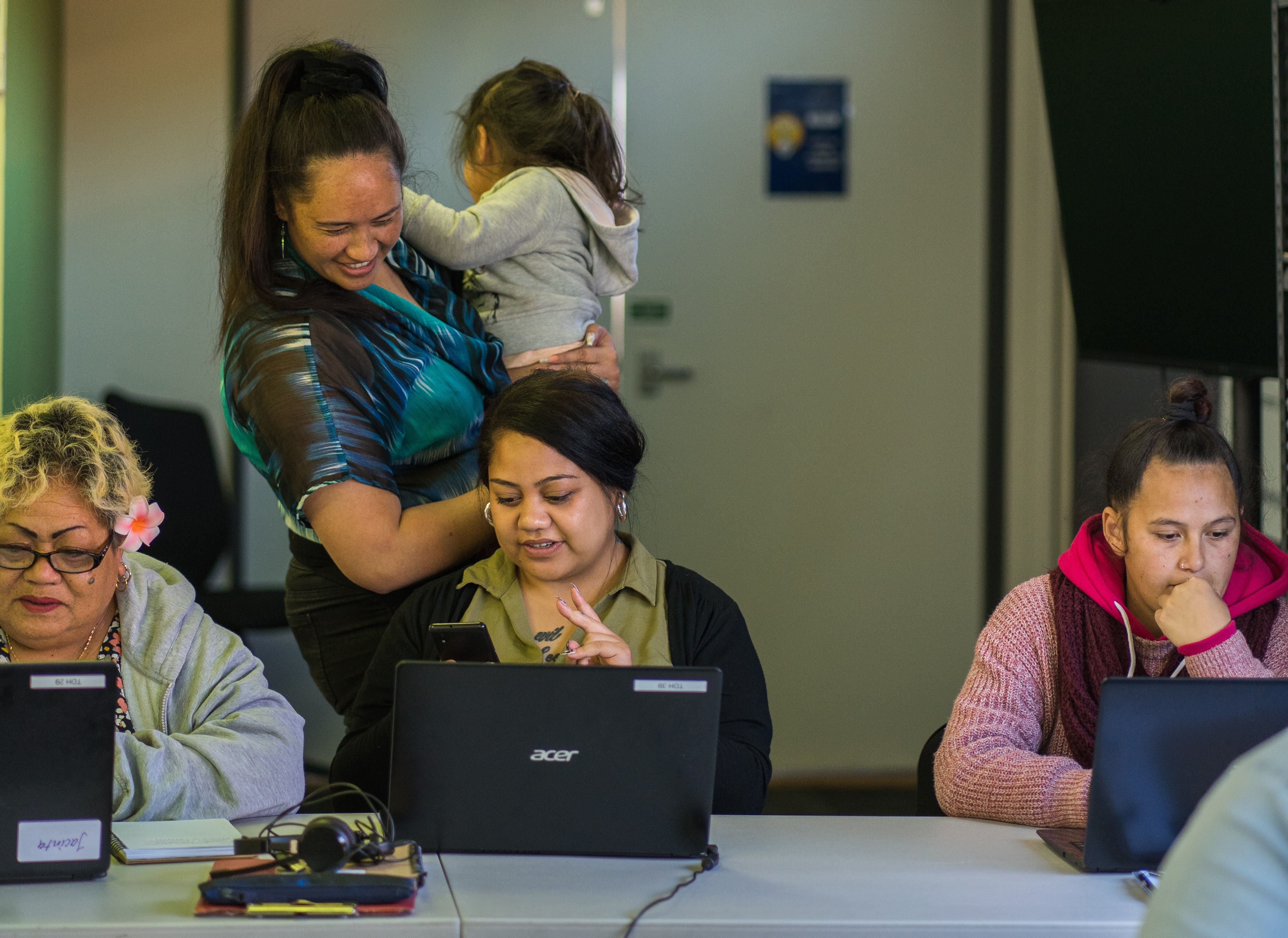Focus area: Healthcare
Aronga: Tautiaki Hauora
On this page

A wāhine standing holding her toddler looks down at another wāhine sitting and working on her laptop
Equitable access to quality healthcare means a Hawke’s Bay where individuals, communities and economies can thrive. To ensure the wellbeing of our whānau we need a resilient workforce that feels valued and resourced to deliver uncompromising care.
New Zealand, and Hawke’s Bay, is facing an unprecedented healthcare crisis. Population growth, increased life expectancy, increasing rates of disease, mental illness and addiction, and COVID-19 are all contributors to previously unseen levels of demand on the healthcare system and workforce.
Hawke’s Bay has many dedicated health professionals and support kaimahi but we know from engagements with the sector that we do not have a sufficient local labour force to meet current and future healthcare workforce needs. High attrition rates due to pay and working conditions have contributed to persistent staff shortages across the system.
The Regional Skills Leadership Group (RSLG) supports all efforts, nationally and regionally, to grow and strengthen the healthcare workforce. We will be focussing on 3 areas of the healthcare workforce in our rohe facing significant obstacles. Te Whatu Ora Hawke’s Bay’s nursing and Allied Health departments account for 6 of the 10 highest vacancy rates across their workforce. Kaiāwhina play a critical role servicing the significant and growing number of aged related residential care (ARRC) facilities in our rohe.
Nurses
Nurses are the largest regulated health workforce in New Zealand and provide care across a diverse range of healthcare settings, but the nursing workforce is in crisis. We have consistently heard that more must be done to improve working conditions and attract and retain kaimahi, especially in our:
- rural communities
- aged related residential care (ARRC) facilities.
The RSLG is in support of initiatives that grow the local nursing workforce. Partnerships like the one between Wairoa Hospital and Te Whare Wānanga o Awanuiārangi provide opportunities to staircase ākonga to higher education, in this example, a Bachelor of Māori Nursing.
Kaiāwhina
Kaiāwhina in the health and disability sector ‘embody the core essence of a workforce that is passionate, resilient, diverse, skilled and committed to supporting hauora (holistic wellbeing) outcomes of all in Aotearoa New Zealand’ (Kaiāwhina Workforce Plan 2020-2025). The ARRC and Home Care Support Services (HCSS) in Hawke’s Bay require a significant kaiāwhina workforce but pay, conditions and the perception these roles are of lower status make it hard to attract and retain kaimahi. Availability and quality of care is suffering as a result. The RSLG recognises the recent reforms and allocation of funding by Te Whatu Ora and Te Aka Whai Ora Māori Health Authority that prioritises providers and their kaiāwhina serving our Māori and rural communities in Wairoa.
Allied health workforce
The Allied Health workforce is made up of 43 professions working across the healthcare system and includes:
- medical laboratory scientists
- psychologists
- dietetics
- occupational therapists.
These practitioners have specialist skills that impact the timeliness of care delivery and perform key functions in proactive and predictive healthcare activities. Acute shortages in these professions must be addressed to deliver on the priority areas identified in Te Pae Tata, the Interim New Zealand Health Plan.
Opportunities | Ngā Ara Wātea
The following opportunities have been identified through consultation and engagement with regional stakeholders:
- Investigate earn-while-you-learn and apprenticeship models for nursing, mental health and allied health workforces. These models reduce the financial barrier to study and in turn grow a more diverse workforce.
- Identify and focus on second-chance learners who are looking for a career change or to re-enter the workforce.
- Provision of culturally appropriate education and training programmes developed by, or in partnership, with community. This will support an increase in the number of Māori and Pacific healthcare kaimahi and grow a workforce that reflects their communities.
- Promote pathways that staircase kaimahi to higher skilled roles.
- Encourage workforce innovation such as the development of interdisciplinary workforces.
- Work with partners to develop a workforce strategy and plan to assure a workforce available to build and staff the planned redevelopment of the hospital.
Action | Taumahi
Undertake a current scope of nursing, kaiāwhina and Allied Health workforce programmes across the rohe. This mahi will allow us to identify where there are opportunities to develop programmes that grow Māori and Pasifika workforces.
Action | Taumahi
Work in collaboration with Te Whatu Ora, Toitū te Waiora, and local training providers to improve workforce pipelines and address critical staffing shortages to grow a resilient health workforce.

